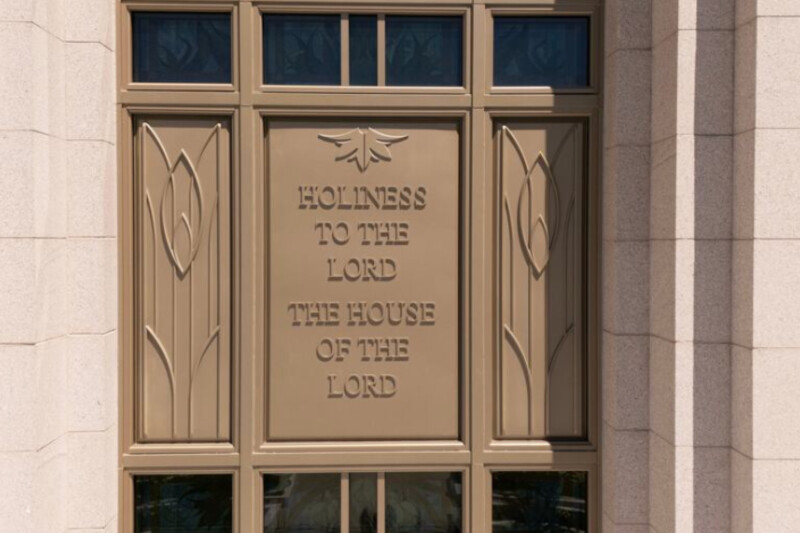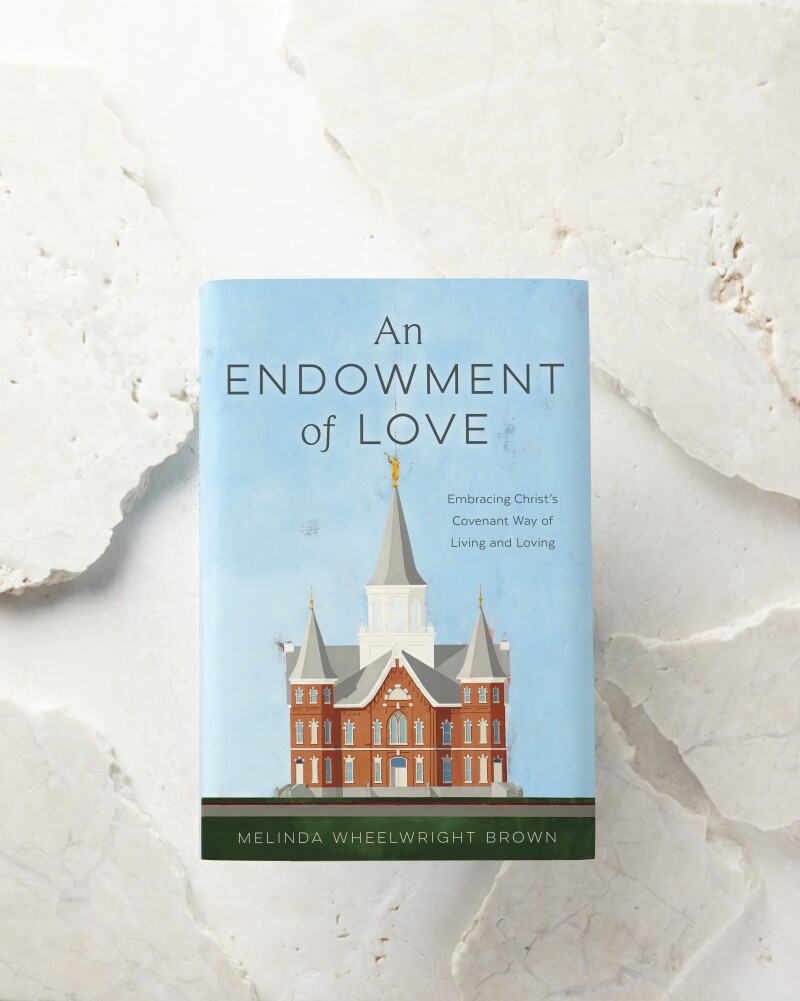Someone you love is preparing to receive their temple endowment, and you couldn’t be happier for them to learn more about this sacred gift. At the same time, you may feel unsure about what to say to help them prepare.
To help guide your talks about the temple, here are a few conversation suggestions based on teachings from author Melinda Brown. Melinda has years of experience teaching a stake temple prep class for students at Brigham Young University. She received a master’s degree from Duke Divinity School and recently published the bestselling book An Endowment of Love.
As you read through Melinda’s insights, consider which talking points will resonate with your loved one the most. While these topics aren’t comprehensive, they can serve as helpful starting points for more meaningful conversations about the endowment.
Point Out Today’s Blessings
Help your loved one understand why the endowment matters now—not just in the eternities. From countless conversations with young adults, Melinda has learned that most young people want to know how the temple can bless their lives today.
“Young people have so many things they’re working on and wrestling with and figuring out at that stage of life that the immediate [future] is so pressing on them,” she explains. “[The endowment] should matter when you walk out the door of the temple. It shouldn’t be something that you’re adding to your hope chest for someday when you get to heaven. ... It’s really meant to bless your life immediately in real time.
“And I think that is what young people ... are really hoping: ‘Please, can you help me see this in a way that [the endowment] matters right now?’”
For Melinda personally, participating in the endowment helps her to apply Christlike principles to her everyday interactions and recognize God’s blessings more regularly. “It’s really helpful to remember that eternity is now,” she suggests. “It’s the whole spectrum of time, and we’re in the middle of a portion of eternity—we’re experiencing it. And so, it really is meant to bless us right now. ...
“If we can see the benefits of it immediately, like [in] the next hour and [with] the next person we talk to—we’re a little softer, a little gentler, a little more patient, all of those things—I think it relieves a whole lot of pressure on any sort of existential challenges you might be feeling. ... You can lighten up on yourself if you realize, ‘I don’t need to worry about why this matters in the distant eternities because it’s making my life better today.’”

Other more immediate blessings of the endowment you could talk about include:
- A stronger sense of unity, belonging, connection, identity, and purpose
- Increased feelings of love for others, especially ancestors
- A renewed commitment to renewing and understanding covenants
- A clearer mind and ability to focus
- More hope, confidence, and perspective during trials
- Greater self-discipline and strength to resist temptation
- Dedicated time to unplug from technology
- Divine guidance in making decisions
Define Divine Law as Love
Another important topic to cover is the role of divine law in God’s love.
“Recognizing that divine law is divine love is crucial because when we see them as opposites or in tension with each other, it can [feel] really complicated,” Melinda says.
She’s noticed that the language around covenantal laws or temple worthiness can sometimes feel troubling to young people—especially if they struggle with scrupulosity or feelings of inadequacy. To help, Melinda suggests likening our temple visits to entering an adoring family member’s home, such as that of a loving grandparent.
“I’ve been blessed with a lot of experiences and good times spent with my several grandparents in their final seasons of life, ... and it’s so clear at that stage of life they just want to pour out love on you,” she explains. “We know [the temple is] the Lord’s house, and He’s the ultimate greatest host that ever lives. I think that [framework] makes a huge difference.”
You can also remind your loved one that God’s laws come from a place of love. He perfectly understands the eternal laws of the universe and wants to teach us how to avoid unnecessary suffering and reach our full potential.
“It’s a matter of ‘this is the way things work and work better,’” Melinda explains.
To further help your loved one see obedience to eternal laws as a gift rather than a hindrance, discuss the power that comes from understanding the physical laws of nature. As researchers and scientists gain a deeper understanding of our world, they can invent more tools and technology to enrich, expand, and even save lives.
“I think that’s the way to explain and grasp these eternal laws. ... The Lord’s trying to say, ‘Come into my house. Let me sit with you. Let me do this with you, and let’s practice wrapping our heads around this grand divine truth that this is the way life works really well.’”

Clarify “Keeping” Covenants
Like other ordinances, the endowment involves making sacred promises with God. To help your loved one see covenants as blessings rather than obligations, Melinda suggests talking about what it truly means to “keep” our covenants.
This scriptural phrase comes from the Hebrew word shamar, which is often translated as “keep” and understood as “obey.” The broader meaning, however, is “to guard, protect, treasure, or cherish.”1 Melinda believes this context can help us shift our covenantal mindset from one of duty to one of love:
“The way that I always try to explain it to [my students] is if I’m trying to foster a healthy marriage, I don’t ask myself when I wake up in the morning, ‘How am I going to keep my marriage today?’ It’s much more natural to [think], ‘Wow, I sure love my husband. How can I show him I love him today? How can I deepen our relationship? And how can our marriage get stronger and stronger every day?’ ...
“In my estimation, that’s a better way to approach covenant relationship because it shifts it from some sort of vague, nebulous idea of all these promises [to keep to] ... principles that really capture Jesus Christ’s way of living and loving.”
Melinda says this understanding can also lead to deeper insights about how the endowment helps us build better relationships with everyone—not just with divinity. You could explore the following questions with your loved one:
- What does it look like to cherish your relationships with others and with God?
- How has living your baptismal covenant impacted your relationships?
- How do you think living the covenants associated with the endowment blesses your relationships—both now and in the future?
Encourage an Open Mind
Invite your loved one to approach their first endowment session with an open mind and to trust that their experience will be unique and evolve over time.
Hearing others’ perspectives on the temple can create expectations or biases that could impact their first impressions.

“Whether you have grown up surrounded by people who absolutely love the temple and that’s all they can rave about to you, or perhaps with some loved ones around you who haven’t had a great experience there, either way, it can really skew the way you’re seeing it,” Melinda explains. “And in some ways, [both expectations] can be almost equally detrimental.”
For example, if someone has heard people say that they’re going to have an amazing experience and then they find themselves feeling uncomfortable or like they don’t understand the temple yet, they may become discouraged and feel reluctant to return. Melinda suggests encouraging them to be patient and put in the spiritual work to understand what the Lord wants them to learn.
If they have questions or worries based on what they’ve heard from friends or social media, Melinda says it’s important to direct them to trusted sources:
“One recommendation I often give is if [they] have some questions about, say, a phrase or an idea, to go to the Church website, to the general conference page, and then, and only there, search that phrase. So many of the ideas that they have questions about have been discussed in general conference and will come up there. And it can get you pointed toward some helpful insights about those ideas [as well].”
Ultimately, remind your loved one that they can talk to the Lord about all of their thoughts and questions about the temple. As President Russell M. Nelson has taught, “The temple endowment was given by revelation. Thus, it is best understood by revelation, prayerfully sought with a sincere heart.”
Remind Them It’s a Starting Point—Not a Finish Line
A phrase that Melinda often repeats in her stake temple prep class about the endowment is this: It’s a starting point—not a finish line. “That is such a crucial distinction to make,” she says. “If we treat this [spiritual] ‘coming-of-age’ experience like the finish-line event, it almost can’t help but be somehow confusing or disappointing or frustrating.”

One analogy that can be helpful is comparing their first endowment experience to a school orientation—not graduation. “When you started college, ... you had a couple days of orientation,” Melinda explains. “You didn’t expect yourself to know everything. In fact, that would be ridiculous. You were coming to start college. It’s not your graduation day; it’s your orientation day. It’s a beginning. If you can let go of that finish-line idea [of receiving the endowment], you give yourself a lot more room for healthy growth.”
Encouraging your loved one to adopt a beginner’s mindset can remove unnecessary pressure and put the focus on learning—a framework that will support them throughout the rest of their lives. “[The temple endowment is] meant to be a lifetime of learning,” Melinda says. “You shouldn’t be able to reason it all out in a few months or a few weeks or your second or third visit. It’s meant to be really rich enough to sustain you for the rest of your life, to have you wondering in the deepest sense of the word ‘wonder.’”
In Melinda’s words, growth is what the gospel of Jesus Christ is all about—and not only when it comes to the temple.
“Tomorrow, when you wake up, treat it as a starting point, not a finish line. Be a little bit gentler and kinder with yourself. And know that as long as you keep turning to the Lord, it’s all good; you’re going to be OK.”
Discover a new approach to temple worship
More articles for you:
▶ Why the temple feels different: An insight from Exodus
▶ 3 divine ways you learn during the presentation of the temple endowment
▶ How to feel at home in the house of the Lord
Note
1. Melinda Wheelwright Brown, An Endowment of Love: Embracing Christ’s Covenant Way of Living and Loving (Deseret Book, 2025), 23.



